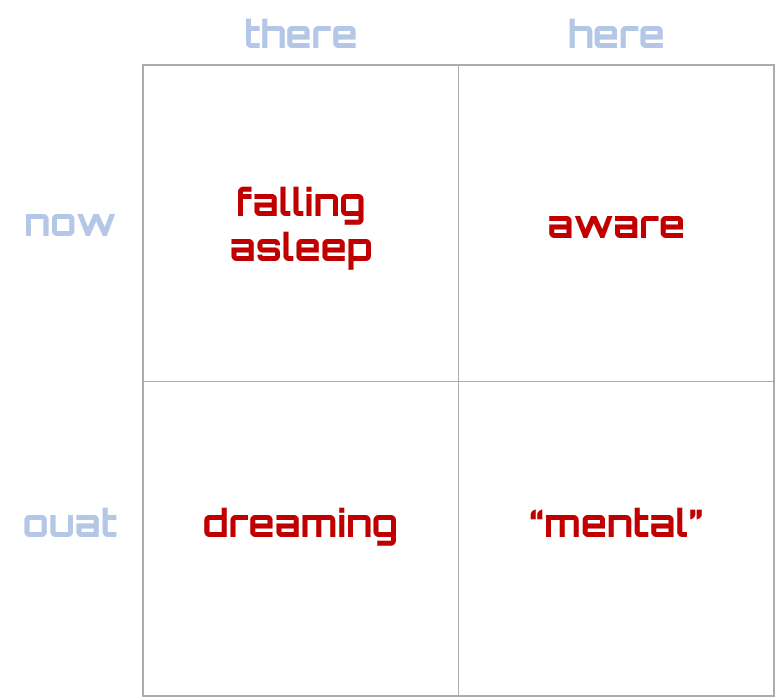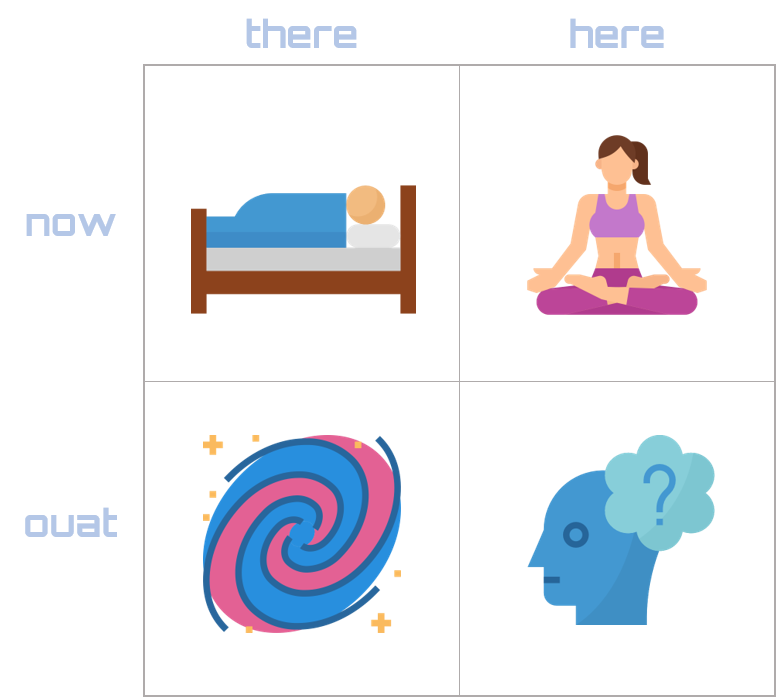It feels so right to begin with here-now as the space-time instantiation in which the mind could be explored. So, let’s display other connected instantiations and see if an understanding also begins to appear.
Let’s break up the place component of space-time in two values: here, of course; and obviously, there. Let’s also break up the time component of space-time in two: now, undoubtedly; and its opposite which could be named not-now, but let’s call it once upon a time or, making it shorter, ouat (suggestion: pronounce it like what?). Since it’s space-time, the four elements need to, forcibly, be combined.
Four possible states of mind:
Something happens in our minds in each one of these four states. If we experience the here-now, we are aware and present. We feel, observe, listen, everything our perceptual apparatus can detect both inside and outside of ourselves. Let’s call it the state of being aware.
I have noticed that being in the now, and at the same time feeling that one’s not here, but there, somewhere else, is what is typically the overall sensation that I experience when I’m about to fall asleep. It’s an empirical one-case repeated observation, maybe not yet generalizable but a true one. So, let’s call this, for the moment, the state of falling asleep.
Once we dive into sleep, inevitably, we start sooner or later to dream. When dreaming, we actually are in a given physical space-time (in our room, at night, for example), but our mind seems to be sensing another completely different space-time instantiation: somewhere there and in a ouat time dimension, in which things happen, ranging from pleasure to terror, as if it were a movie or a series. Let’s simply call this mysterious thing the state of dreaming.
Finally, we can be wake, consciously in a place, here, but into the ouat time dimension. That’s when we are thinking, remembering, getting stuck within an emotion, etc., without too much realizing that we are doing what we are doing, mentally. It’s like being “mental” as the British like to call someone who’s lost his mind. Then let’s humorously call this the “mental” state.
Icons made by Monkik. Thanks to Flaticon.
Each state has its raison d'etre. Being aware is very important, because it is in itself what help us survive and celebrate the joy of life at its fullness. But it could be overwhelming, so we need to sleep and then dream to compensate. But, getting lost in thoughts, emotions, memories, shouldn’t be necessary at all? I’d say it’s inevitable, unless one reaches a state of full enlightenment, a sort of Nirvana, way beyond our everyday life.
This very theory, points out implicitly at a meta-level state of awareness, which brings the possibility of exercising our capacity to witness ourselves. So, one has the capacity of realizing in which state one is in, regardless of the state in which we are at a given moment. From there, connections between states can be made and from such connections, imagination may flourish.
The “mental” state can become a productive or healthy one, as long as it can be witnessed from the meta level of awareness and combined with all the others.
Please, remember this is a draft.




